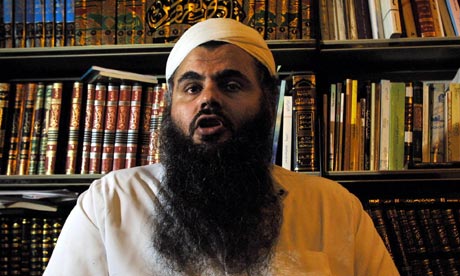Abu Qatada to be released imminently
Radical Islamist cleric will live with his family under a 22-hour curfew with severe restrictions on his activities
Abu Qatada will live with his family under a 22-hour curfew with severe restrictions on his activities after he is released. Photograph: AP
The radical Islamist cleric Abu Qatada is to be released imminently from Long Lartin maximum security prison in Worcestershire.
Abu Qatada is to be taken to an address in London, where he will live with his immediate family under a 22-hour curfew and with severe restrictions on his activities for the remaining two hours of the day.
The judicial communications office said on Monday that bail conditions had been agreed without the need for a further court hearing.
Negotiations had been going on since last week between the special immigration appeals commission (Siac) and the Home Office over details of the bail conditions and had been expected to be finalised by Mr Justice Mitting on Monday.
The decision by Siac to order the release of Abu Qatada on bail followed the European court of human rights ruling that he would face an unfair trial based on evidence obtained by torture if he were sent back to Jordan. The European judges said that would amount to a "flagrant denial of justice".
The Home Office minister James Brokenshire is travelling to Jordan this week in an attempt to get a fresh reassurance that Abu Qatada would face a fair trial if he were sent back to Amman. David Cameron spoke to the King of Jordan on Thursday in an attempt to find a solution to the case that could clear the way for Abu Qatada's deportation.
"They agreed on the importance of finding an effective solution to this case, in the interests of both Britain and Jordan," a Downing Street spokesman said.
The release of Abu Qatada, who has been described by a Spanish judge as Osama bin Laden's right-hand man in Europe, comes despite the fact that Siac has accepted that he continues to pose a risk to national security.
The details of his bail conditions are to be published when they are finalised but they are expected to be some of the strictest available under English law. They include 22-hour curfew enforced by an electronic tag – six hours longer than the 16 hours maximum allowed under a terrorism control order – and severe restrictions on his access to telephone and computer communications.
His movements during the two separate hours he is allowed out of the vetted address will also be within a tight geographical area.
The home secretary, Theresa May, made clear in the Commons last Thursday that he would not be able to take his children on the school run, as he had done during six months spent on bail in 2007. He is also expected to be banned from leading prayers at any mosque.
Mitting has given the Home Office three months to make "demonstrable progress" on securing fresh assurances from Jordan. The judge has warned that he will have to relax the stringent bail conditions after those three months if no progress is made and there is no realistic prospect of deporting Abu Qatada.
Abu Qatada has spent nearly nine years in detention or under effective house arrest without being charged since he was first imprisoned under emergency anti-terrorism legislation in Belmarsh top security prison, London, in October 2002. He has spent six and a half years in detention or under 22-hour curfew under immigration powers pending his deportation.


No comments:
Post a Comment